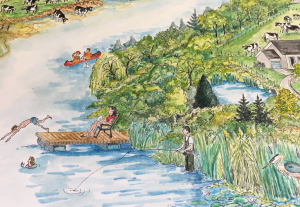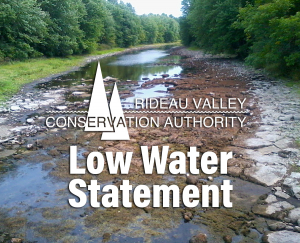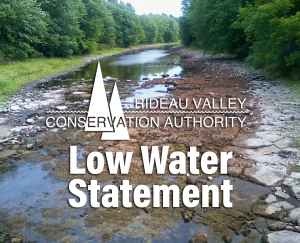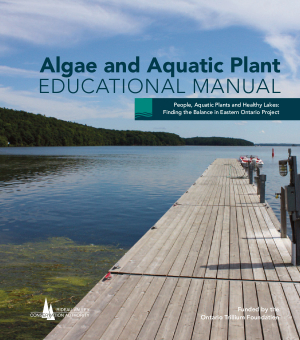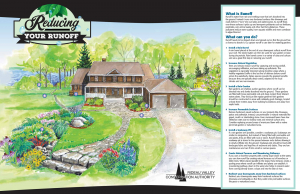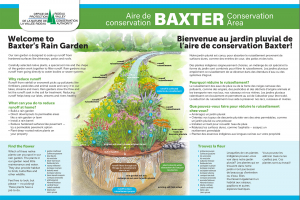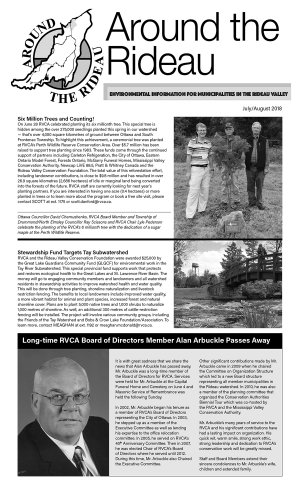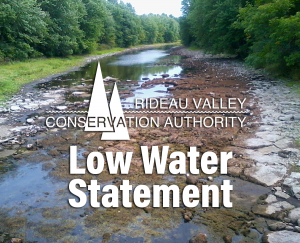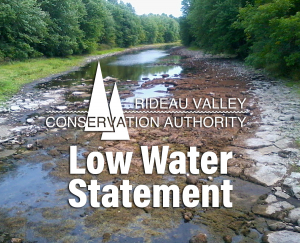Super User
TAY SUBWATERSHED, July 24, 2018 — Thanks to special funding through the Great Lakes Guardian Community Fund, the Rideau Valley Conservation Authority (RVCA) is covering costs for shoreline restoration projects to landowners in the Tay Subwatershed.
Landowners whose land drains into the Tay River or one of its 14 catchments (portions of Central Frontenac, Drummond/North Elmsley, Rideau Lakes, South Frontenac and Tay Valley Townships) could be eligible for full cost coverage for shoreline naturalization planting and partial funding for tree planting and livestock restriction fencing projects.
RVCA and the Rideau Valley Conservation Foundation were awarded $25,000 by the Great Lakes Guardian Community Fund for environmental work specifically located in the Tay River Subwatershed. This special provincial fund supports work that protects and restores ecological health to the Great Lakes and St. Lawrence River Basin. The money will go towards stewardship activities that will improve watershed health and water quality.
“The RVCA is always looking to work with landowners and businesses who want to help improve water quality,” says Meaghan McDonald. “We do this by undertaking what’s known as best management practices — which are basically simple, practical and affordable ways to manage our resources and let nature do her job on our behalf.”
Unaware of the importance of shoreline vegetation, many landowners clear their shorelines and transform them into urban landscapes. They destroy the cattails, bulrushes and other native species. These changes destroy the balance of the aquatic and shoreline ecosystem. They also alter the wildlife habitat, natural beauty and character of our lakes and rivers. The clean water and features that landowners valued in their waterfront property are compromised.
Fortunately, degraded shorelines can be restored. More and more cottagers and landowners understand the value of natural shorelines.
Tree planting and shoreline naturalization are two easy ways to reduce erosion, filter pollutants and provide valuable habitat to local species. Fencing and restricting livestock from accessing watercourses also protects the shoreline, reduces erosion and keeps animal waste from directly entering creeks, streams and rivers.
“Our goal is to plant at least 5,000 native trees and 1,000 shrubs to naturalize 1,000 metres of shoreline as part of this special project, says Ms. McDonald. “We also hope to work with local farmers and see an additional 300 metres of fencing installed to reduce livestock access to watercourses.”
RVCA staff are looking to connect with interested landowners and conduct site visits and prepare project plans in the coming few months. Fencing projects can be undertaken at any time, but planting projects are being planned now for completion in spring of 2019.
“The success of the program relies largely on landowner interest,” says Ms. McDonald. “We really hope to work with landowners and balance their needs with the needs of the environment. Making the shoreline program free will hopefully enhance participation.”
The project is well supported locally, with participation from community groups including the Friends of the Tay Watershed and Bobs & Crowe Lake Foundation/Association.
“Everyone here wants the same thing,” says Ms. McDonald. “A clean, healthy waterway supporting a vibrant, sustainable community. Working together we hope to maintain and protect the Tay River system.”
To learn more or get involved, contact Meaghan at ext. 1192 or . To learn more about the health of the Tay River Subwatershed and what can be done to maintain and improve local conditions, visit watersheds.rvca.ca.
“Moderate” Low Water Condition in Rideau River Watershed
July 19, 2018 – This statement is to advise that the low water status in the Rideau River watershed is now at Moderate severity.
Rainfall in the last 90 days, measured at climate stations in and around the watershed, is about 60% of the normal amount for the time of year which is the threshold for Moderate Severity Low Water. Rain presently forecast for much of next week will be welcome but is not expected to have a significant impact. Longer range forecasts indicate temperatures above normal and precipitation below normal through the rest of the summer and into the fall.
Although daytime highs greater than 30 degrees appear to be passing, it will still be warm enough for evaporation to continue to reduce water levels on all lakes and streams. Levels and streamflows are below normal for the time of year but are still above critical thresholds. Flows in smaller streams will be raised briefly if the shortrange weather forecasts prove to be accurate.
Rideau Canal reservoir lakes are at levels typical of later into September. However, there have been no reports of insufficient draft on the Rideau Canal system relayed to the Conservation Authority.
Conditions are expected to decline generally. Conservation Authority staff continue to monitor conditions and communicate with water managers throughout the watershed. Updates to this message will be issued as conditions warrant.
Water conservation is recommended for everyone within the Rideau River watershed including residents on private wells inside the City of Ottawa boundary. Those who have permits for taking water from surface or groundwater sources are encouraged to reduce their actual taking as much as possible. Residents on private well systems are also urged to use water conservatively. Using rain barrels to capture any rain to water lawns and gardens. Avoid using pressure washers to clean houses, driveways, decks and fences. All these actions contribute to the conservation of our water resources. Municipalities may have invoked water restrictions so check your municipal website for applicable bylaws.
- Other relevant information sources are:
- Ministry of Environment and Climate Change: https://www.ontario.ca/page/managing-your-water-well-times-water-shortage
- Ontario’s Low Water Response program: https://www.ontario.ca/page/low-water-response-program.
- RVCA website: (www.rvca.ca)
- Hourly and daily streamflows and water levels: https://www.rvca.ca/watershed-monitoring-reporting/reporting/streamflow-water-levels
“Moderate” Low Water Condition in Rideau River Watershed
July 19, 2018 – This statement is to advise that the low water status in the Rideau River watershed is now at Moderate severity.
Rainfall in the last 90 days, measured at climate stations in and around the watershed, is about 60% of the normal amount for the time of year which is the threshold for Moderate Severity Low Water. Rain presently forecast for much of next week will be welcome but is not expected to have a significant impact. Longer range forecasts indicate temperatures above normal and precipitation below normal through the rest of the summer and into the fall.
Although daytime highs greater than 30 degrees appear to be passing, it will still be warm enough for evaporation to continue to reduce water levels on all lakes and streams. Levels and streamflows are below normal for the time of year but are still above critical thresholds. Flows in smaller streams will be raised briefly if the shortrange weather forecasts prove to be accurate.
Rideau Canal reservoir lakes are at levels typical of later into September. However, there have been no reports of insufficient draft on the Rideau Canal system relayed to the Conservation Authority.
Conditions are expected to decline generally. Conservation Authority staff continue to monitor conditions and communicate with water managers throughout the watershed. Updates to this message will be issued as conditions warrant.
Water conservation is recommended for everyone within the Rideau River watershed including residents on private wells inside the City of Ottawa boundary. Those who have permits for taking water from surface or groundwater sources are encouraged to reduce their actual taking as much as possible. Residents on private well systems are also urged to use water conservatively. Using rain barrels to capture any rain to water lawns and gardens. Avoid using pressure washers to clean houses, driveways, decks and fences. All these actions contribute to the conservation of our water resources. Municipalities may have invoked water restrictions so check your municipal website for applicable bylaws.
- Other relevant information sources are:
- Ministry of Environment and Climate Change: https://www.ontario.ca/page/managing-your-water-well-times-water-shortage
- Ontario’s Low Water Response program: https://www.ontario.ca/page/low-water-response-program.
- RVCA website: (www.rvca.ca)
- Hourly and daily streamflows and water levels: https://www.rvca.ca/watershed-monitoring-reporting/reporting/streamflow-water-levels
Algae and Aquatic Plant Educational Manual
Baxter Conservation Area Rain Garden Poster
Lake Association Resources
Lake Planning Program
NEW! Lake Protection Workbook —A Self-Assessment Tool for Shoreline Property Owners
 Learn all about the important functions of your shoreline property. Score yourself and learn about how you can make improvements that benefit your lake, river or stream.
Learn all about the important functions of your shoreline property. Score yourself and learn about how you can make improvements that benefit your lake, river or stream.
This Workbook was produced by the Lake Links Planning Committee with collaboration and review from: Cataraqui Region Conservation Authority, Friends of the Tay Watershed Association, Lake Networking Group, Lanark County Stewardship Council, Mississippi Valley Conservation Authority, Ontario Ministry of Natural Resources and Forestry, Rideau Valley Conservation Authority, and Watersheds Canada.
Printing funded by Watersheds Canada and the Daniel and Susan Gottlieb Foundation.
Digital downloads are free (8.6 MB). Printed copies are $1.50. Contact for more details.
Background
From 2005 to 2008, the Lake Management Planning Program provided information and guidance to lake groups within the Tay Valley Township and the Tay River Watershed interested in developing lake plans. The program was organized by the Friends of the Tay Watershed, Lanark County Stewardship Council, Mississippi Valley Conservation Authority, Otty Lake Association, Rideau Valley Conservation Authority, and the Tay Valley Township.
The Lake Management Planning Program provided:
- Information packages on the benefits and process of lake planning;
- Workshops aimed at sharing information about lake issues;
- Support and assistance in the development of State of the Lake Reports and Lake Plans;
- A comprehensive website offering helpful lake planning resources and templates
2009 Onward . . .
Although the funding for this very successful program has come to an end, the partners remain committed to lake planning and continued support for the development of lake plans to protect the health of local lakes and their watersheds. For more information, resources and assistance contact meaghan.mcdonald@rvca.
Helpful Links
- Lake Planning Handbook for Community Groups
- North American Lake Management Society
- A Citizen’s Guide to Lake Protection
- Guide to Lake Protection and Management
- Landowner Resource Centre
- Example Lake Plans and State of Lake Reports are available by request.
Lake Links Workshops
Since 2002, the Lake Links Workshop has been an annual opportunity for representatives of lake associations and other volunteer stewardship groups in Eastern Ontario to come together with government and non-government agencies to listen to speakers, share information, and address common lake and river issues that matter most to Eastern Ontario communities. The workshop has become an important networking opportunity for these groups and has fostered excellent partnerships, communication and collaboration with regional government and non-government organizations.
For more information on the Lake Links Workshop, visit Watersheds Canada.
More Resources
“Minor” Low Water Condition in Rideau River Watershed
July 10, 2018 – This statement is to advise that present conditions in the Rideau River watershed are now at the threshold for Minor Low Water status under the Ontario Low Water Response Program.
Rainfall in the last 90 days, measured at climate stations in and around the watershed, is about 80% of the normal amount for the time of year which is the threshold for Minor Low Water. The present heat wave with several daytime high temperatures above 30 degrees has burned lawns and wilted plants in gardens. Lake levels and streamflows are below normal for the time of year but are still above critical thresholds. Smaller streams will be drying up as they do most years. There is flow in larger streams in the watershed but it is declining.
With the hot weather that continues to cause considerable evaporation, Rideau Canal reservoir lakes are at levels typical of early August. There is, though, sufficient water for Parks Canada – Ontario Waterways to state that draft and navigation are normal throughout the Rideau Canal system.
Conditions are expected to decline with no significant rain in the present 5 day forecasts. Conservation Authority staff continue to monitor conditions and communicate with water managers throughout the watershed. Updates to this message will be issued as conditions warrant.
All watershed residents are encouraged to conserve water at all times but they should be particularly conservative when low water conditions occur.
Other relevant information sources are:
- Ministry of Environment and Climate Change: https://www.ontario.ca/page/managing-your-water-well-times-water-shortage
- Ontario’s Low Water Response program: https://www.ontario.ca/page/low-water-response-program.
- RVCA website: www.rvca.ca
- Hourly and daily streamflows and water levels: https://www.rvca.ca/watershed-monitoring-reporting/reporting/streamflow-water-levels
“Minor” Low Water Condition in Rideau River Watershed
July 10, 2018 – This statement is to advise that present conditions in the Rideau River watershed are now at the threshold for Minor Low Water status under the Ontario Low Water Response Program.
Rainfall in the last 90 days, measured at climate stations in and around the watershed, is about 80% of the normal amount for the time of year which is the threshold for Minor Low Water. The present heat wave with several daytime high temperatures above 30 degrees has burned lawns and wilted plants in gardens. Lake levels and streamflows are below normal for the time of year but are still above critical thresholds. Smaller streams will be drying up as they do most years. There is flow in larger streams in the watershed but it is declining.
With the hot weather that continues to cause considerable evaporation, Rideau Canal reservoir lakes are at levels typical of early August. There is, though, sufficient water for Parks Canada – Ontario Waterways to state that draft and navigation are normal throughout the Rideau Canal system.
Conditions are expected to decline with no significant rain in the present 5 day forecasts. Conservation Authority staff continue to monitor conditions and communicate with water managers throughout the watershed. Updates to this message will be issued as conditions warrant.
All watershed residents are encouraged to conserve water at all times but they should be particularly conservative when low water conditions occur.
Other relevant information sources are:
- Ministry of Environment and Climate Change: https://www.ontario.ca/page/managing-your-water-well-times-water-shortage
- Ontario’s Low Water Response program: https://www.ontario.ca/page/low-water-response-program.
- RVCA website: www.rvca.ca
- Hourly and daily streamflows and water levels: https://www.rvca.ca/watershed-monitoring-reporting/reporting/streamflow-water-levels
